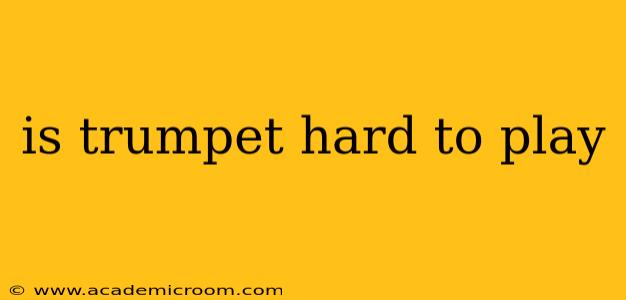Is Trumpet Hard to Play? A Comprehensive Guide
The question, "Is trumpet hard to play?" doesn't have a simple yes or no answer. The difficulty of learning trumpet depends on several factors, including your musical background, natural aptitude, practice habits, and personal goals. While some find it relatively easy to pick up the basics, mastering the instrument requires significant dedication and perseverance.
This guide will delve into the challenges and rewards of learning the trumpet, addressing common questions and misconceptions.
What are the initial challenges of learning trumpet?
Beginning trumpet players often face several hurdles. Developing proper embouchure (mouth position) is crucial for producing a clear, resonant tone. This takes time, patience, and consistent practice. Many beginners struggle with breath control, needing to develop the lung capacity and airflow necessary for sustained notes and strong dynamics. Finger coordination also presents a challenge, requiring precise movements to achieve accurate notes and transitions.
How long does it take to learn to play the trumpet?
The time it takes to learn trumpet varies greatly. Some individuals might grasp basic techniques within a few months, playing simple melodies and scales. Others may require years of dedicated practice to achieve proficiency. The definition of "learning" also impacts this timeline. Are you aiming for casual playing, joining a band, or pursuing a professional career? Your goals will directly influence the time commitment required.
Is it harder to learn trumpet than other instruments?
Compared to other brass instruments, the trumpet is often considered to be moderately challenging. Its smaller mouthpiece requires a more precise embouchure than instruments like the tuba or trombone. However, it's arguably easier to learn than woodwind instruments, which necessitate complex fingerings and breath control techniques. Ultimately, the "hardest" instrument is subjective and depends on individual strengths and preferences.
What are some common mistakes beginners make?
Many beginners struggle with consistent tone production, often producing a breathy or weak sound due to improper embouchure. Incorrect posture can also hinder performance, affecting breathing and embouchure. Lastly, rushing the learning process frequently leads to frustration and poor technique. Consistent, focused practice is far more effective than sporadic, intense sessions.
How can I improve my trumpet playing?
Consistent practice is paramount. Focus on building a strong foundation in embouchure, breath control, and basic techniques before tackling more complex pieces. Regular lessons with a qualified instructor are highly beneficial, providing personalized guidance and feedback. Listening to professional trumpet players can also help refine your musicality and technique.
What makes the trumpet a rewarding instrument to learn?
Despite the challenges, the trumpet offers a deeply rewarding musical experience. The instrument's bright, expressive tone is captivating, allowing for a wide range of musical styles. The sense of accomplishment that comes from mastering challenging pieces and improving one's skills is incredibly motivating. Playing the trumpet can build confidence, discipline, and a lifelong appreciation for music.
In conclusion, learning the trumpet presents its share of difficulties, but the rewards for dedicated individuals are substantial. With consistent practice, good instruction, and a passion for music, anyone can learn to play and enjoy the trumpet.
